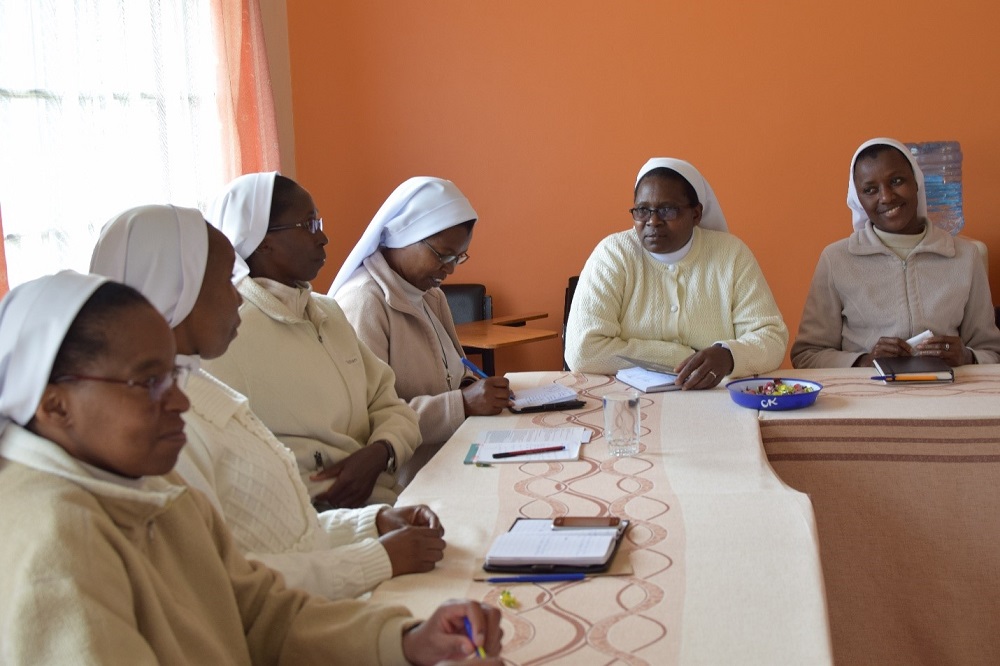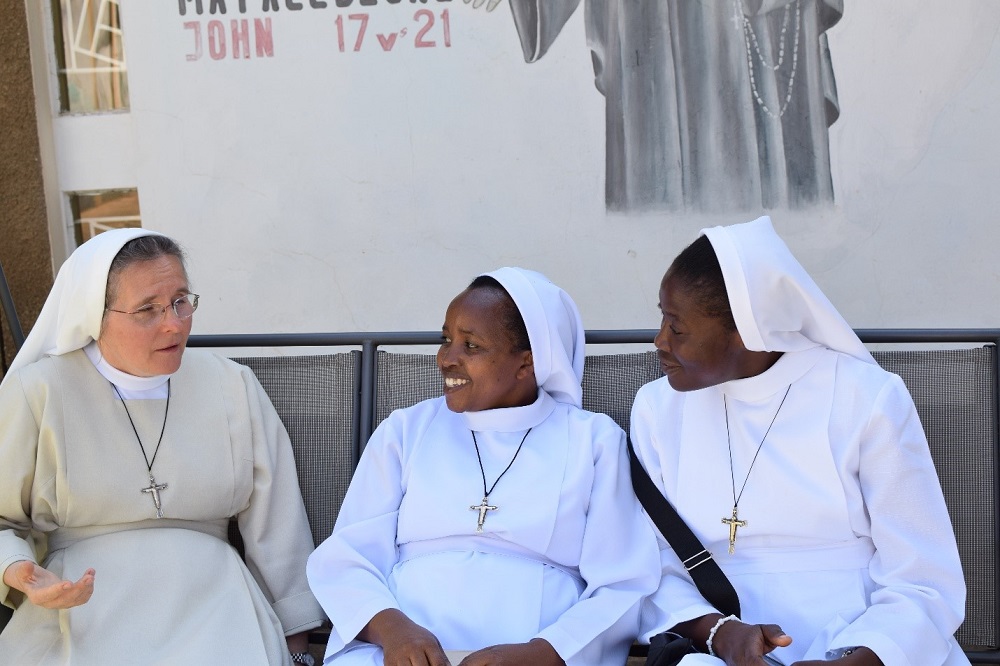
Missionary Sisters of the Holy Family talk about their experiences as part of their 2019 canonical visitation meeting in Nairobi, Kenya. (Courtesy of Lilian Atieno)
I want to echo the words of Sr. Elizabeth Nziwa Oyuka of the Assumption Sisters of Nairobi, Kenya: Wherever people are living and/or working together, there will be conflict. Religious communities are not an exception since religious live in a world filled with conflicts.
Oyuka presented a webinar workshop on conflict management in November in Nairobi, part of a series of education for leadership by the Leadership Guild of Tangaza University sponsored by the Association of Sisterhoods of Kenya and the Conrad N. Hilton Foundation. (Editor's note: The Hilton Foundation also funds Global Sisters Report.) She was addressing religious across the globe who are called by our vowed life to be ministers of reconciliation and resolution at all costs. I found her words very valuable and proper for myself, as I live in a religious community.
Sharing personal experiences of community and ministry life, Sister brought us light and help. She described her own experiences of conflict and those of others in religious organizations that have caused enough pain that some religious have exited the life or lived a life of endless pain. She asked us: "What [else] do you think causes conflicts in our congregations/communities?" I want to share what I have learned from some of my own experiences.
I have observed that job/ministry misplacement is sometimes a cause of conflict in religious congregations. Being assigned to a ministry that is not the choice of the individual can at times cause conflict with self and frequently with the leadership, too. I say "with self" because of the shock that can come with such an assignment and how it can keep one disoriented for a long time.
This is particularly true if the religious is not adequately prepared to engage in that particular ministry or job. What can make things worse is if there is no room for dialogue about the assignment with the leadership. Therefore, to be able to survive and protect their vocation, some sisters have to redouble their efforts to integrate themselves into the ministry. I can compare this misplacement of sisters in ministry with a soldier without a weapon or a diver who is made to dive without the oxygen mask. Without the necessary preparation, delivery of the services will not only be difficult, but will require extra skills and efforts, which sometimes prove to be practically impossible.
Advertisement
Another example relates to interpersonal relationships in community living, in which anyone can be an initiator or a victim of conflict. When conflicts arise in my congregation, our leadership has always tried to be vigilant to curb it before it escalates. When the conflict is between two sisters, leadership meets with each sister separately and talks with them about the need to forgive and live in peace.
At other times, leadership has the sisters in conflict sit down together to talk through the issues and, when necessary, intervenes without taking sides. Additionally, the leadership has invited competent speakers from outside to facilitate such topics in community to support and challenge the sisters in ways of working with conflict. The leadership would at times also encourage the sisters to look for counselors or spiritual directors to journey with them at a personal level.
Transferring instigators or victims of conflict to another local community, as is often done in religious life, is not a solution. That usually just transfers the conflict to another convent. The same is sometimes true in work-related situations in which conflicts with clergy or other authorities result in the sister being reassigned rather than being helped to deal with the conflict. Religious leaders should be bold enough to confront the situation and work with it so as to be real agents and ministers of reconciliation.
Work-related challenges or conflicts are bound to happen and will always be part of life. Conflicts with a clergyman or other authorities in workplaces can lead to reassignment or the desire to flee to a new place. Such behavior prevents a great opportunity to learn and exercise competencies in conflict resolution, communication and reconciliation.

Sr. Eva Korbut, left, superior general of the Missionary Sisters of the Holy Family, from Poland listens to her sisters share their work-related experiences in Lusaka, Zambia, during her canonical visit in 2019. (Courtesy of Lilian Atieno)
In some cases of a sister's conflict with the clergy or other authorities, I have observed that the leadership of my congregation tends to act as a mediator for reconciliation by giving feedback to the clergy or authority, explaining how their action or behavior is affecting the sister. Another strategy I have seen is that leadership will identify a fellow clergyperson to raise the concern with his colleague and help open the window for discussion and finding solutions.
Today, as we live in a world full of contradictions and the deep crises of diseases like COVID- 19, hunger, poverty and ignorance, everyone is a candidate for conflict. We all work with families or students who are suffering from these issues and need help navigating the difficulties of relationships. Our role is to be ministers of reconciliation and to counteract disunity, wherever and whenever we find it.
As Sister pointed out to us in her presentation, community life is the training ground for this work. As sisters, we come together in community as strangers brought together by the love of God and our desire to build God's reign of peace and justice. But it is not an easy task, and it takes practice. Conflicts are bound to rise, and so learning the skills of management is so important.
I believe that religious community leaders can help foster these skills by calling for community meetings or frequent open discussions to help sisters air their views about what is happening in their lives together, hence minimizing or preventing community conflicts. On the other hand, I would also caution leaders who do not have conflict- and management-resolution skills themselves to not attempt to solve community conflicts. Incompetence can leave the sisters or community more wounded and broken than before. It is important to find help from professionals or those with expertise to help sisters. In the meantime, these leaders need to seek education for themselves and become models of sensible, fair and efficient conflict management.







